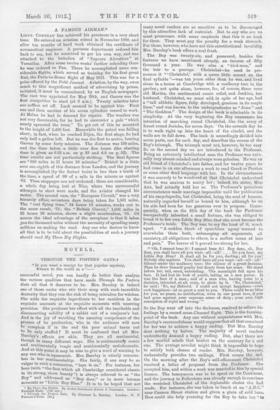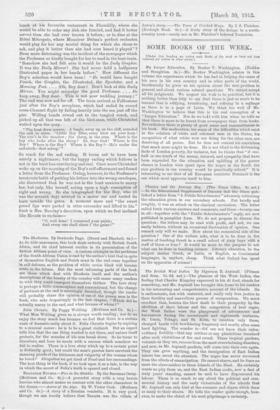NOVELS.
THROUGH THE POSTERN GATE•t "Iv you want a receipt for that popular mystery, Known to the world as a "—
successful novel, you can hardly do better than analyse the various qualities that have made Through the Postern Gate all that it deserves to be. Mrs. Barclay is indeed one of those cooks who stir their soup with such incredible dexterity that they run the risk of being mistaken for witches. She adds the requisite ingredients to her cauldron in the requisite amounts at the requisite moments with unerring precision. She produces her effect with all the inevitable and disconcerting solidity of a rabbit out of a conjurer's hat. And in the joy of watching the amazing competence of the process of its production, who in the audience will care to complain if in the end the poor animal turns out to be only stuffed? It must be confessed that all Mrs. Barclay's effects are akin. They are all sentimental, though in many different ways. She is sentimentally comic and sentimentally tragic and sentimentally melodramatic. And at this point it may be wise to give a word of warning to any one who is squeamish. Mre, Barclay is utterly remorse- less in her sentimentality. She fairly, if one may be so vulgar in such a connexion, "lays it on." For instance, her hero (with "the face which all Cambridge considered classic in its strong, stern beauty ") is always referred to as "the Boy" and addressed as "Boy dear," or in more intense moments as "Little Boy Blue." It is to be hoped that not
Three Big Flights.
Eveleigh Nnah. 1108. By Andre Beaumont (Liout. J. Cowman). London
t Through the Postern Gate, By Florence L. Barclay. London; G. P. Vutnam's Sons. Olga
many novel readers are so sensitive as to be discouraged by this attractive lack of restraint. But to any who arc we must pronounce with some emphasis that this is no book for them. They must pay the penalty for a weak stomach.
For those, however, who have not this constitutional invalidity Mrs. Barclay's book offers a real feast.
The Boy was twenty-six, and possessed, besides the features we have mentioned already, an income of fifty thousand a year. He was also a "bird-man," and the heir to a peerage. Christobel—he used to pro- nounce it 14' Christobei,' with a queer little accent on the final syllable "—was ten years older than lie was, and lived alone in a house at Cambridge with a mulberry tree in the garden ; not quite alone, however, for, of course, there were old Martha, the sentimental comic relief, and. jenkins, her husband. Christobel, we must add, in spite of her age, had a "tall athletic figure, fully developed, gracious in its ample lines," and was known to the undergraduates as " Juno " and.
"The Goddess." The design of the book is admirable in its simplicity. At the very beginning the Boy announces his intention of marching round Christobel, like the army of Israel round Jericho, for seven days. On the seventh day lie is to walk right up into the heart of the citadel, and the walls are to fall down. The book is accordingly divided into seven parts, one for each day, and describes the course of the Boy's triumph. The triumph must not, however, be too easy So on the second day we are introduced to the Professor.
Being an extremely intellectual man the Professor was natu- rally very absent-minded and always wore goloshes. He was an old friend of Christobel's late father, and for twelve years be had come in on one afternoon a week to read Greek or Persian or some other dead language with her. In the circumstances it was scarcely to be wondered at that Christobel understood that he was anxious to marry her ; indeed, his sister, Miss Ann, had actually told her so. The Professor's penurious circumstances made marriage impossible until the publication of his encyclopmdia, but Christobel, being the soul of honour, naturally regarded herself as bound to him, although he on his side had been far too generous ever to propose. Conse- quently, when on the fifth day of the book the Professor unexpectedly inherited a small fortune, she was obliged to break it to her own Little Boy Blue that she must become the Professor's bride. The Boy was, to say the least of it, much upset. "A sudden throb of speechless agony 'seemed to overwhelm them both, submerging all arguments, all casuistry, all obligations to others, in a molten ocean of love and pain." The horror of it proved too strong for her.
"Oh, I cannot bear it1 I cannot bear it Boy dear, oh, Boy dear, you shall have all you wish—all—all1 . . Do you hear, my Little Boy Blue? It shall all be for you, darling ; all for you Nobody else matters. You shall have all you want—all—all—all" Silence under the mulberry tree ; the silence of a great decision. Then he drew himself gently but firmly from her arms. He stood before her, tall, erect, unbending. The moonlight fell upon his face. It had lost its look of youth, taking on a new power. It was the face of a man ; and of a man who, having come to a decision, intended, at all costs, to abide by it. 'No, Christobel,' he said ; 'No, my Beloved. I could not accept happiness—oven such happiness—at so great a cost to you. There could be no bliss for you, no peace, no satisfaction, even in our great love, if you had gone against your supreme sense of duty ; your own high conception of right and wrong.'" So the Boy went off into the darkness, resolved to relieve hib feelings by a record cross-Channel flight. This is the turning. point of the book. Any one without acquaintance with Mrs. Barclay's resourcefulness would suppose that all that remained for her was to achieve a happy ending. But Mrs. Barclay does nothing by halves. The majority of novel readers undoubtedly demand a happy ending. But, alas 1 there are a few morbid minds that hanker on the contrary for a sad ono. The average novelist might think it impossible to hope to satisfy both classes of reader. Mrs. Barclay, however, undauntedly provides two endings. First comes the sad. On the morning after the Boy's self-effacement Christobel received a letter of proposal from the Professor. She accepted him, and within a week was married to him by special licence. The honeymoon was to be spent on the Continent, and the journey to Folkestone was already enough to convince the wretched Christobel of the deplorable choice she had. made. For instance, she was taken to lunch at an " A.B.C."
near Cannon Street station and given a plate of cold ham. How could she help yearning for the Boy to take her " to lunch at his favourite restaurant in Piccadilly, where she would be able to order any dish she fancied, and find it better served than she had ever knowu it before ; or to dine at the Hotel Metropole, where Monsieur Delma's perfect orchestra would play for her any mortal thing for which she chose to ask, and play it better than she had ever heard it played" P Even more distressing was the incident of the newspaper which the Professor so kindly bought for her to read in the boat-train. "Somehow she had felt sure it would be the Daily Graphic. It was the Daily Mirror! She had never held a. halfpenny illustrated paper in her bands before." How different the Boy's selection would have been! "Ho would have bought Punch, the Graphic, the Illustrated, the Spectator, and a 3forning Post. . . . (Oh, Boy dear I Don't look at this Daily Mirror. You might misjudge the good Professor. . . Do keep away, Boy dear. This is not your wedding journey.) "
The end was now not far off. The train arrived at Folkestone just after the Boy's aeroplane, which had ended its record cross-Channel flight by falling heavily into the sea just off the pier. Willing bands rowed out to the tangled wreck, and picked up all that was left of the bird-man, while Christobel waited upon the quay.
"The boat drew nearer. A bugle, away up on the cliff, sounded the call to arms. 'Little Boy Blue, come blow me your horn ! The cow's in the meadow ; the sheep, in the corn. Where is the boy who looks after the sheep ? Ah, dear God ! Where is the Boy ? Where is the Boy ? Where is the Boy P—He's under the sail-cloth—fast asleep."
So much for the sad ending. It turns out to have been merely a nightmare ; but the happy ending which follows is not in the least less convincing and real. Once more Christobel woke up on the morning of the Boy's self-effacement and found a letter from the Professor. Owing, however, to the Professor's inveterate habit of putting his letters into the wrong envelopes,
she discovered that he was not in the least anxious to marry her, but only, like herself, acting upon a high conception of right and wrong. So she telegraphed for the Boy, who (it was the seventh day) arrived in a motor car and tooted its horn outside the gates. A moment more and "the sweet proud lips wore parted in utter surrender and lifted to his." Such is Mrs. Barclay's decoction, upon which we feel inclined like Hecate to exclaim-
" 0, well done! I commend your pains ; And every one shall share i' the gains !"







































 Previous page
Previous page